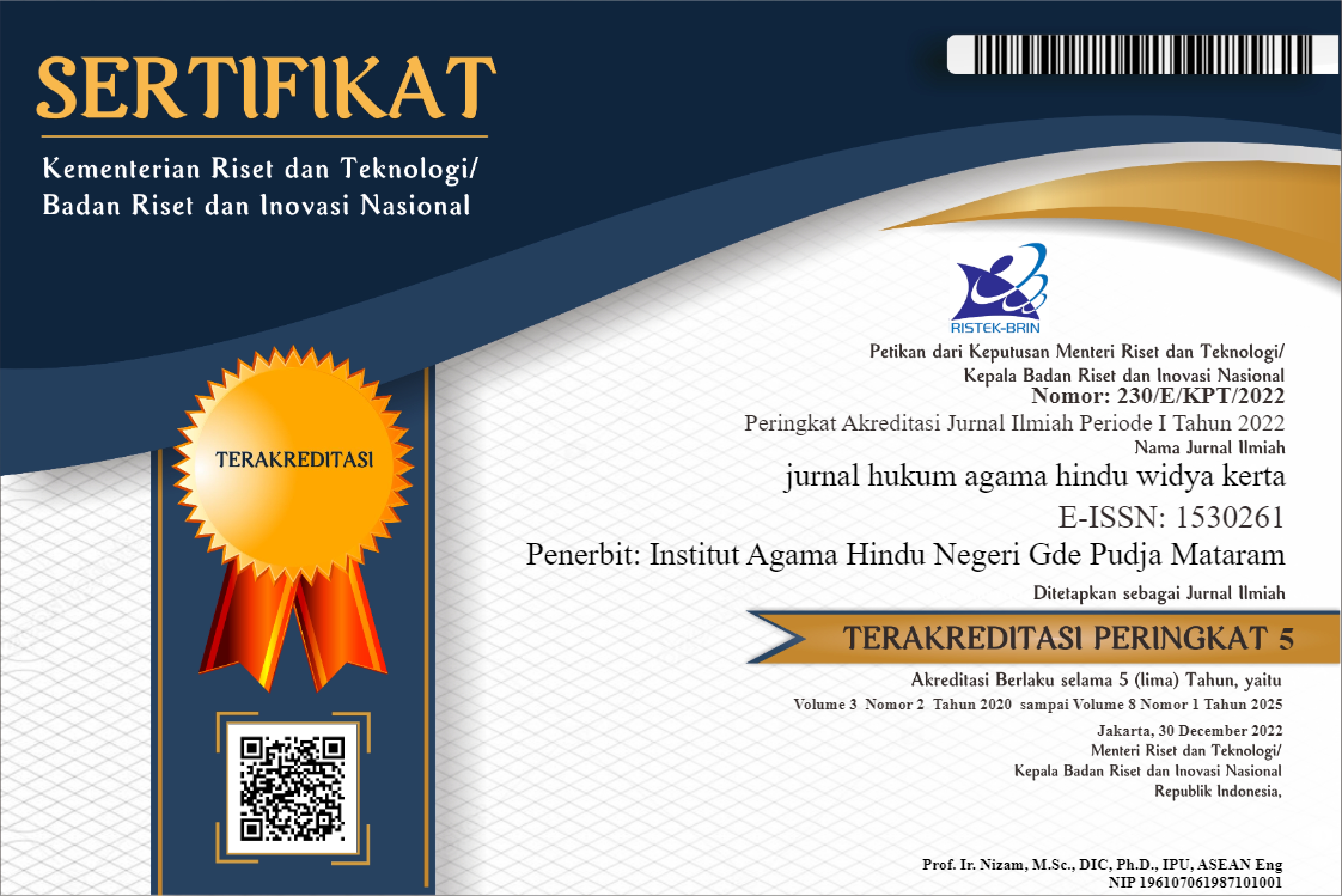MENGGUGAT KEBEBASAN INDIVIDU DALAM PENEGAKAN UU ITE PERSPEKTIF EKSISTENSIALISME JEAN PAUL SARTRE
Abstract
In Indonesia, human freedom is fostered through the democratic concept of Pancasila. However, sometimes human freedom with democracy still cannot be realized freely, because this freedom for some people is limited by Law No. 11 of 2008 concerning electronic information and transactions or commonly referred to as the ITE Law. The reason is, the ITE Law seems to regulate human freedom in the use of information media and electronic technology which should provide freedom and encourage the development and progress of information. Supposedly, the function and establishment of the law are to solve the problem of cybercrime Cybercrime. However, the law is instead used to restrict everyone's freedom of opinion, argument, and opinion. According to Satre freedom for humans in an authentic form capable of being responsible for what is done. That is, freedom for the Sastre is the essence of man so that man can choose what he should do without the need for subjective limitations. The purpose of this paper is to define human freedom in the ITE Law through Sartre's existentialism. This research is library research with qualitative methods. This research is considered important to guide that the ITE law restricts human existential freedom.
Di Indonesia kebebasan individu dibina melalui konsep demokrasi Pancasila. Namun, terkadang kebebasan individu melalui prinsip demokrasi di Indonesia masih belum terealisasikan secara adil. Pasalnya, UU ITE seolah-olah mengatur kebebasan individu dalam penggunaan media informasi dan teknologi elektronik serta menyelesaikan permasalahan kejahatan dunia maya Cyber crime. Akan tetapi, di sisi lain UU justru digunakan untuk membatasi kebebasan setiap orang untuk berpendapat, berargument, beropini. Menurut Satre kebebasan bagi manusia dalam bentuk otentik yang mampu bertanggungjawab atas apa yang diperbuat. Artinya, kebebasan bagi Sastre merupakan esensi manusia sehingga manusia dapat memilih apa yang seharusnya dia lakukan tanpa perlu Batasan secara subjektif. Tujuan dari penulisan ini adalah mengartikan kebebasan individu di dalam UU ITE melalui kaca mata eksistensialisme Sartre. Penelitian ini merupakan penelitian pustaka (library research) dengan metode kualitatif. penelitian ini dianggap penting untuk memberikan panekanan bahwa seharusnya penegakkan hukum UU ITE tidak membatasi kebebasan eksistensial manusia.
References
Abidin, Z. (2012). Pengantar Filsafat Barat. PT Raja Grafindo Persada.
Ahmad, A. (2009). Agama dalam Kerangka Pikir Ateisme Jean-Paul Sartre. Parafrase, 9(2), 36–42.
Ari Dermawan, Sumantri, S. (2020). PENERAPAN UU ITE DI INDONESIA SMA NEGERI 3 KISARAN. Jurdimas Jurnal Pengabdian Kepada Masyarakat, 3(1), 59–64.
Bertens, K. (1996). Filsafat Barat abad xx Prancis. PT Gramedia Pustaka Utama.
Copleston, F. (1994). A History of Philosophy Volume IX: Modern Philosophy from the French Revolution to Sartre, Camus, and Lévi-Strauss. Doubleday Dell Publishing Group, Inc.
Fadilah Raskasih. (2021). Batasan Kebebasan Berpendapat Melalui Media Elektronik Dalam Perspektif Ham Dikaitkan Dengan Tindak Pidana Menurut Uu Ite. Journal Equitable, 5(2), 147–167. https://doi.org/10.37859/jeq.v5i2.2462
Hadi, H. (1996). Jati Diri Manusia berdasarkan Filsafat Organisme Whitehead. Kanisius.
Harahap, S. (2014). PERBEDAAN KONSEPSI RECHTSTAAT DAN THE RULE OF LAW SERTA PERKEMBANGAN DAN PENGARUHNYA TERHADAP HUKUM ADMINISTRASI NEGARA. Jurnal Ilmiah Hukum Dirgantara, 5(1), 57–63.
Hardiningtyas, P. R. (2015). Manusia dan Budaya Jawa dalam Roman Bumi Manusia: Eksistensialisme Pemikiran Jean Paul Sartre. Aksara, 27(1), 83–98. https://aksara.kemdikbud.go.id/jurnal/index.php/aksara/article/view/174
Hikmawati, P. (2010). PENEGAKAN HUKUM TERHADAP UNDANG.UNDANG NO.11 TAHUN 2OO8 TENTANG INFORMASI DAN TRANSAKSI ELEKTRONIK. Kajian, 15(2), 227–252.
Indriyana, I., Trisiana, A., & Amelia, J. (2021). Dampak Undang-Undang Informasi dan Transaksi Elektronik Terhadap Masyarakat Indonesia. Journal of Civics and Education Studies, 8(2), 117–131. http://dx.doi.org/10.32493/jpkn.v8i2.y2021.p117-131
Kemkominfo. (2016). Undang-Undang Republik Indonesia Nomor 19 Tahun 2016 Tentang Perubahan Atas Undang-Undang Nomor 11 Tahun 2008 Tentang Informasi Dan Transaksi Elektronik. UU No. 19 Tahun 2016, 1, 1–31. https://web.kominfo.go.id/sites/default/files/users/4761/UU 19 Tahun 2016.pdf
Kosanke, R. M. (2017). PENCEMARAN NAMA BAIK KEPADA SESEORANG DIHUBUNGKAN DENGAN KEBEBASAN BERPENDAPAT MENURUT UNDANG-UNDANG PERS INDONESIA. Lex Privatum, V(3), 29–35.
Lavine, T. . (2002). Petualangan Filsafat dari Socrates ke Sartre. Jendela.
Luhut Sitorus, E. L. F. (2022). Kekuatan Hukum Layanan Pesan Singkat Sebagai Alat Bukti dalam Pencemaran Nama Baik Ditinjau dari Undang-Undang ITE. Jurnal Iustitia Omnibus, 3(1), 63–75.
Muhaimi. (2020). Metode Penelitian Hukum.
Muhammad Junaidi, Kaji Sukarna, B. S. (2020). PEMAHAMAN TINDAK PIDANA TRANSAKSI ELEKTRONIK DALAM UNDANG- UNDANG NO 19 TAHUN 2016 TENTANG INFORMASI DAN TRANSAKSI ELEKTRONIK Muhammad. Jurnal BUDIMAS, 2(2), 109–118.
Nasution, L. (2020). Hak Kebebasan Berpendapat dan Berekspresi dalam Ruang Publik di Era Digital. ’Adalah, 4(3), 37–48. https://doi.org/10.15408/adalah.v4i3.16200
Putra, A. E. (2022). Kajian Hukum Pasal 27 ayat 3 UU ITE Terhadap Kebebasan Berpendapat Masyarakat. Justitia: Jurnal Ilmu Hukum Dan Humaniora, 9(5), 2366–2374.
Rahmawati, N., Muslichatun, M., & Marizal, M. (2021). Kebebasan Berpendapat Terhadap Pemerintah Melalui Media Sosial Dalam Perspektif Uu Ite. Widya Pranata Hukum : Jurnal Kajian Dan Penelitian Hukum, 3(1), 62–75. https://doi.org/10.37631/widyapranata.v3i1.270
Rhiti, H. (2011). Filsafat Hukum dari Klasik sampai Postmodern.
Safitri, R. (2018). Undang-Undang Informasi dan Transaksi Elektronik Bagi Perguruan Tinggi. SALAM: Jurnal Sosial Dan Budaya Syar-I, 5(3), 197–218. https://doi.org/10.15408/sjsbs.v5i3.10279
Sartre, J.-P. (2001). Jean-Paul Sartre: Basic Writings. In S. Priest (Ed.), Jean-Paul Sartre: Basic Writings (first publ). Routledge. https://doi.org/10.4324/9780203129647
Siswanto, J. (1998). Sistem-Sistem Metafisika Barat dari Aristoteles Sampai Derrida, cetakan (pertama). Pustaka Pelajar.
Syahri, S. A. (2010). Kebebasan Berpendapat melalui Media Baru dalam Bayang-bayang UU Informasi dan Transaksi Elektronik (ITE). Cakrawala-Jurnal Humaniora ., 10(1), 26–31.
Tambunan, S. F. (2016). Kebebasan Individu Manusia Abad Dua Puluh: Filsafat Eksistensialisme Sartre. Jurnal Masyarakat &Budaya, 18(2), 215–232. https://jmb.lipi.go.id/jmb/article/view/412/304
Yunus, F. M. (2011). KEBEBASAN DALAM FILSAFAT EKSISTENSIALISME JEAN PAUL SARTRE. Al-Ulum, 11(2), 267–282.

This work is licensed under a Creative Commons Attribution-ShareAlike 4.0 International License.
Authors who publish with this journal agree to the following terms:
- Authors retain copyright and grant the journal right of first publication with the work simultaneously licensed under a Creative Commons Attribution License that allows others to share the work with an acknowledgement of the work's authorship and initial publication in this journal.
- Authors are able to enter into separate, additional contractual arrangements for the non-exclusive distribution of the journal's published version of the work (e.g., post it to an institutional repository or publish it in a book), with an acknowledgement of its initial publication in this journal.
- Authors are permitted and encouraged to post their work online (e.g., in institutional repositories or on their website) prior to and during the submission process, as it can lead to productive exchanges, as well as earlier and greater citation of published work.














